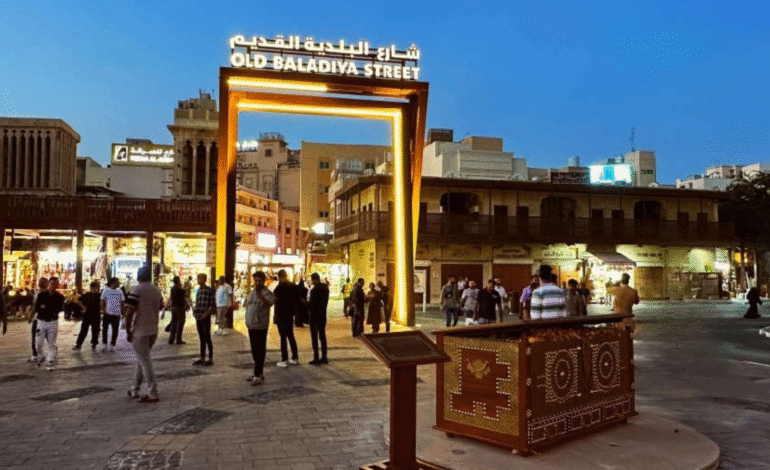Dubai Completes Dh9.5 Million Heritage Trails in Deira Markets

Dubai Municipality has completed a major project to improve Deira’s historic markets, unveiling three new heritage trails worth AED 9.5 million. The trails stretch across 1,784 metres and connect some of Dubai’s most famous traditional markets. This project is designed to preserve the city’s cultural history while improving the experience for visitors and supporting more than 500 shops.
Reviving Deira’s Historic Identity
Deira has always been an important part of Dubai’s culture and trade. The new trails are meant to celebrate that history while making the area more attractive to visitors. Covering 25,800 square metres, this project is also in line with the Dubai 2040 Urban Master Plan, which focuses on sustainable growth and heritage preservation.
The three new heritage trails are:
- Gold Souq Trail: A 995-metre walkway through Dubai’s world-famous gold and jewellery market.
- Al Ahmadiya School Heritage Axis: A 430-metre trail linking the city’s first school to nearby heritage landmarks.
- Spice Souq Axis: A 359-metre trail that brings new life to Dubai’s vibrant spice market.
These trails connect seven traditional markets: Herbs Market, Spice Souq, Utensils Souq, Perfume Market, Carpets Market, Textiles Souq, and Household Market. They also connect with the Gold Souq and Al Ahmadiya heritage district, giving visitors an easy way to explore both shopping and cultural history.
Making the Visitor Experience Better
Dubai Municipality has made many improvements to make the trails more comfortable and attractive. Some of the key upgrades include:
- Shaded walkways with fabric structures covering 210 square metres.
- A new 200-square-metre canopy behind Bin Naeem Mosque.
- 38 signboards and 154 floor markings to help guide visitors.
- Better lighting for shop façades to highlight traditional styles.
- Improved pavements covering 770 square metres to make walking easier.
These improvements make it easier for visitors to enjoy the markets while keeping their cultural charm.
Keeping Authentic Heritage Alive
To ensure the markets keep their original look and feel, Dubai Municipality used traditional local materials in the restoration. Sarooj, a lime-based plaster used for centuries in the UAE, was applied to market structures. Wooden shading was repaired and restored, while open spaces were upgraded for comfort and appearance.
The project also developed three public squares. New seating, shaded areas, and amenities were added to encourage visitors to relax and spend more time exploring.
Boosting Culture and Economy Together
Bader Anwahi, CEO of the Public Facilities Agency at Dubai Municipality, explained the importance of the project: “Deira’s heritage and traditional markets are an inseparable part of Dubai’s cultural identity. This project respects that history while keeping pace with the future.”
The trails create more opportunities for local traders and attract more visitors to Deira. By mixing shopping with cultural exploration, the project supports small businesses and makes Dubai even more appealing as a global tourism hub.
Deira as a Global Cultural Destination
These new heritage trails highlight Dubai’s goal of becoming a leading cultural tourism destination. Many international visitors today look for authentic experiences, and projects like this help Dubai stand out. The Gold Souq, Spice Souq, and other historic markets now form part of a unique visitor journey that blends culture, history, and shopping.
From the colourful textiles to the scents of spices and the brilliance of gold, every market tells a story about Dubai’s past and present. With these trails, visitors can explore all of it in one seamless journey.
Linked to Dubai’s 2040 Urban Master Plan
The heritage trails are part of Dubai’s 2040 Urban Master Plan, which aims to balance development with sustainability and heritage protection. By upgrading Deira’s cultural areas, Dubai Municipality ensures these markets continue to thrive as important cultural landmarks while supporting the city’s tourism growth.
Helping Local Traders Grow
With over 500 shops included in the trails, this project directly supports traders, artisans, and family businesses. Better facilities, shaded areas, and improved paths attract more visitors, which helps increase sales and makes business more sustainable.
This approach shows Dubai’s balance between modern growth and cultural preservation, offering benefits to both visitors and the local economy.
A Perfect Blend of Old and New
Dubai Municipality has shown how tradition and modern development can work hand in hand. Deira’s markets are no longer just trading areas—they are now cultural attractions where people can enjoy the history of Dubai while experiencing modern facilities.
From restored wooden shades to improved walkways, every detail of this project was designed with care. It ensures that Deira remains a living heritage site for future generations.







